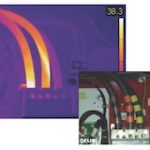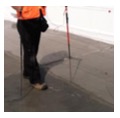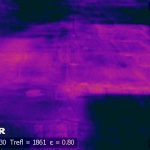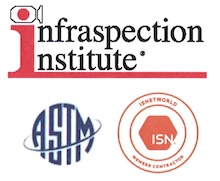Company News
Site Conditions Needed for IR Flat Roof Surveys
The success of an Infrared Flat Roof Moisture Survey is dependent on many site conditions. The Required Site Conditions have been developed to comply with current industry procedures and standards including ASTM and Infraspection Institute.

• Solar Loading with a mostly sunny day
• Minimum Daytime Temperature above 40° F
• Winds less than 15 mph
• No precipitation on the day of the Survey
Click here for a full copy of Required Site Conditions.
IR Inspection of Emergency Equipment
 Emergency Equipment: UPS systems, emergency generators and fire pumps are some of the most common defenses for facilities. While most facilities perform IR inspections of their electrical distribution systems at least annually, many fail to inspect or incorrectly inspect their emergency equipment.
Emergency Equipment: UPS systems, emergency generators and fire pumps are some of the most common defenses for facilities. While most facilities perform IR inspections of their electrical distribution systems at least annually, many fail to inspect or incorrectly inspect their emergency equipment.
During a recent Infrared Electrical System Survey,
Introducing Electric Field Vector Mapping – EFVM®
Jersey Infrared Consultants, pioneers in the Infrared Industry since 1984, are pleased to offer another form of non-destructive testing – ElectricField Vector Mapping, or EFVM®.
 EFVM® is a type of non-destructive testing used to locate a breach or void in a waterproofing membrane. During testing, an electrical current at low voltage is used to create an electrical potential between a non-conductive membrane and a grounded conductive deck or substrate.
EFVM® is a type of non-destructive testing used to locate a breach or void in a waterproofing membrane. During testing, an electrical current at low voltage is used to create an electrical potential between a non-conductive membrane and a grounded conductive deck or substrate.
Giving Back to the Industry
Jersey Infrared Consultants’ vice president, Mary Molle, is serving on the Board of Directors and is the secretary for the Metro NY Chapter of RCI. The Metro NY Chapter of RCI is an affiliated chapter of RCI, Incorporated, which is an international association of professional consultants, architects, and engineers who specialize in the specification and design of roofing, waterproofing and building envelope systems.
The Metro NY Chapter of RCI is an affiliated chapter of RCI, Incorporated, which is an international association of professional consultants, architects, and engineers who specialize in the specification and design of roofing, waterproofing and building envelope systems.
Educational Programs for Your Facility
J ersey Infrared Consultants are pleased to offer educational programs for your facility, staff, or organization. These information-based programs are presented by Level III Infraspection Institute Certified Infrared Thermographers® and are designed for all levels and trades, including maintenance staff, upper management, project managers, engineers, and architects.
ersey Infrared Consultants are pleased to offer educational programs for your facility, staff, or organization. These information-based programs are presented by Level III Infraspection Institute Certified Infrared Thermographers® and are designed for all levels and trades, including maintenance staff, upper management, project managers, engineers, and architects.
Seminars range from general Overview of Infrared Thermography to specific application programs.
Infrared Thermography Goes Underground
 Moving more than 5 million people over almost 850 miles of track each day is a challenging proposition for one of America’s largest subway systems. Reliability and safety are top priorities for this system, which operates 24/7/365.
Moving more than 5 million people over almost 850 miles of track each day is a challenging proposition for one of America’s largest subway systems. Reliability and safety are top priorities for this system, which operates 24/7/365.
Infrared Surveys of Single-Ply Roofs
We are frequently asked if an Infrared Survey can be performed on a roof with a single-ply or reflective membrane. The answer is “YES, IF…” the survey is performed under the acceptable conditions with the correct imager.
The way to deal with the reflectivity of smooth roof membranes is to utilize a thermal imager with short wave (2 to 5.6 micron) spectral response.  This will help to eliminate reflections from the roof and can increase inspection accuracy.
This will help to eliminate reflections from the roof and can increase inspection accuracy.
Visit our Case Studies From the Field article or contact us to discuss your specific concerns.
Standards vs. Scope of Work for Infrared Surveys
A Standard may be defined as a criterion set of practices. There are a number of standards and specifications published for infrared thermography. Current standards and specifications that apply to infrared thermography are published by ASNT, ASTM, NETA, NFPA, and Infraspection Institute. These standards cover certification of personnel, operation of equipment, safety, and inspections of electrical, mechanical, and structural systems.
Infrared Standards vs Infrared Scope of Work
Infrared standards vs infrared scope of work:
 A Standard may be defined as a criterion set of practices. There are a number of standards and specifications published for infrared thermography. Current standards and specifications that apply to infrared thermography are published by ASNT, ASTM, NETA, NFPA, and Infraspection Institute. These standards cover certification of personnel, operation of equipment, safety, and inspections of electrical, mechanical, and structural systems.
A Standard may be defined as a criterion set of practices. There are a number of standards and specifications published for infrared thermography. Current standards and specifications that apply to infrared thermography are published by ASNT, ASTM, NETA, NFPA, and Infraspection Institute. These standards cover certification of personnel, operation of equipment, safety, and inspections of electrical, mechanical, and structural systems.
Infrared Thermography for Predictive and Preventive Maintenance

Infrared thermography for predictive and preventive maintenance has become a common tool over the past 30 years. Inspections of electrical, steam, and roof systems are part of a facility’s annual maintenance schedule and have their own budget line.